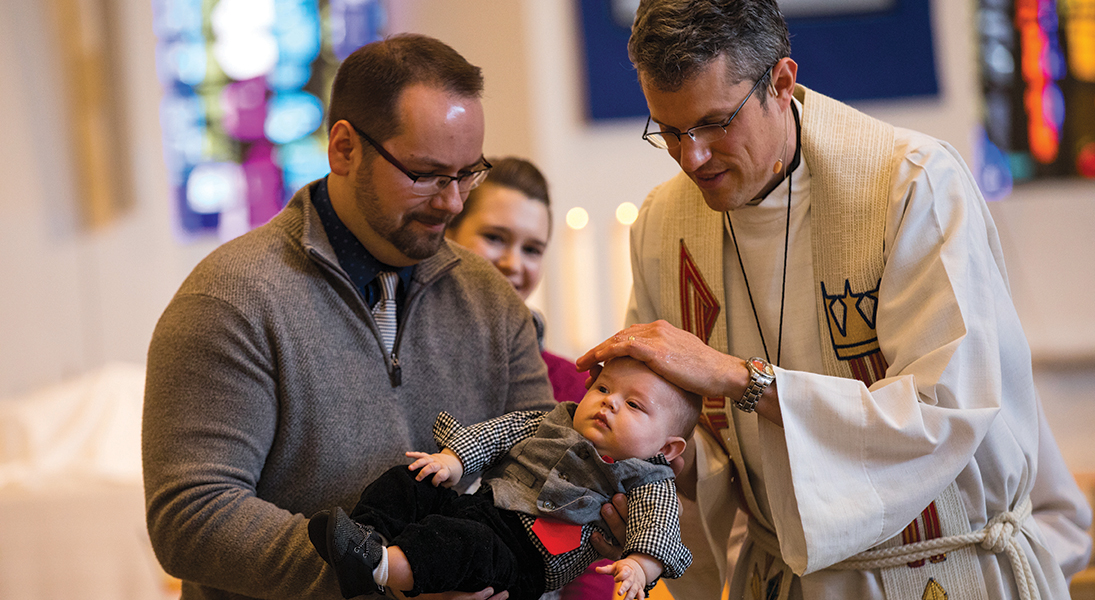Here’s a familiar Sunday scene: Before worship begins, a baby wearing a white gown is passed around between parents, grandparents and godparents. Noticing the baptismal party, parishioners check the bulletin for this new member’s name.
When it’s time for the baptism, parents and godparents encircle the font and, with the congregation, make promises. The assembly renounces the devil and recites the Apostles’ Creed. Finally, the pastor splashes the baby three times with water and says, “I baptize you in the name of the Father, and of the Son and of the Holy Spirit.” A prayer of thanks, the sign of the cross, and lighting the candle come afterward, then the congregation welcomes the newly baptized.
But what happens next is often tragic. That’s because for many newly baptized infants, what happens next is … nothing. No programmed ministry, no staff member or volunteer dedicated to early faith formation, no parent classes, no Sunday school, no small groups, no playgroups, no Bible-story time, no prayer chains, no baptismal birthday celebrations. Numerous congregations offer nothing to help infants or toddlers and their caregivers build faith. Usually Sunday school and other programs begin at age 3.
The first three years of life are a time of remarkable neuroplasticity for children eager to learn about the world around them. That world can include facets of Bible stories, worship and other faith practices.
The ELCA is the church that boldly welcomes babies into God’s family through the waters of baptism, yet we often wait years before fulfilling the baptismal promises made at the font. Perhaps we believe infants and toddlers are too young for faith-based experiences to make a difference.
The last few decades of early childhood research tell us otherwise. From the attachment relationships young children form with caregivers to the ways that immersing them in language and music provide neurologically rich experiences, we know the early years matter. The first three years of life are a time of remarkable neuroplasticity for children eager to learn about the world around them. That world can include facets of Bible stories, worship and other faith practices.
Imagine what early childhood ministry could look like in this church if we committed to fulfilling our baptismal promises to little ones the moment those waters splash over them. Here are some ideas to try in your congregation.
Understand the needs and gifts of young children and help them feel at home in your congregation. When you see babies and toddlers, watch how they move, explore, babble, cry, squeal, sleep, eat and play. If you expect them to stay quiet and still during worship, your expectations often won’t be met. But if you delight in their movement, sounds and energy, you’ll get a glimpse of why Jesus told us we must be like children to enter the kingdom of heaven.
Understand the needs of their parents too. Parenting a child is physically and emotionally demanding. Marriage care often sinks to the bottom of the list because parents need to address more immediate child care concerns. Whether you have children or not, you can support parents of young children in many ways. Your congregation may do meal deliveries for new parents or offer baby-sitting connections. Find out if a baptismal gift-—like a children’s Bible—is given. Prayer is always welcome.
Go where children gather. If you haven’t visited your congregation’s nursery lately, plan a quick trip. On your visit, warmly greet the children, their parents and the nursery caregivers. Check out the room, toys and decor. If you have the resources and feel called to give, ask what a monetary gift to the nursery could provide. Most nursery coordinators have a list of toys, furnishings and room improvements that never get funding in the annual budget. (Note to parents of adult children: This is not a call to donate your child’s toys from two decades ago to the nursery!)
Open your heart and programs to little ones. Early childhood ministry isn’t just for children and their families. Get ready for those little ones to minister to you too. If you’ve ever been perked up by the delightful smile of an infant or the generosity of a toddler sharing a snack, you’ve seen the gifts they have to offer.
As far as children’s programming goes, look for ways to open existing ministries to young children. Perhaps you could offer Bible-story time for parents and infants during the Sunday school hour or create a track of vacation Bible school for toddlers and their parents.
Young children are growing up in a world where church membership and participation is rapidly declining. If you only look at the studies on religious life in the U.S., the results can be discouraging. Nevertheless, we also know that families need support and encouragement amid their busy, pressured lives. Your congregation has a great opportunity to be a sanctuary of nurture for them.
Consider committing to living out the promises of baptism by praying for, supporting and delighting in the young children at your congregation.









